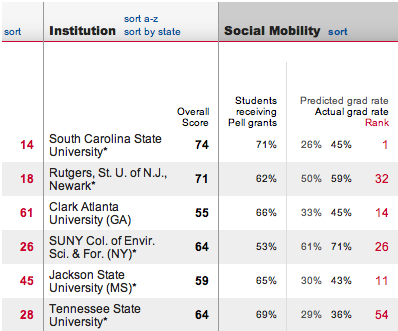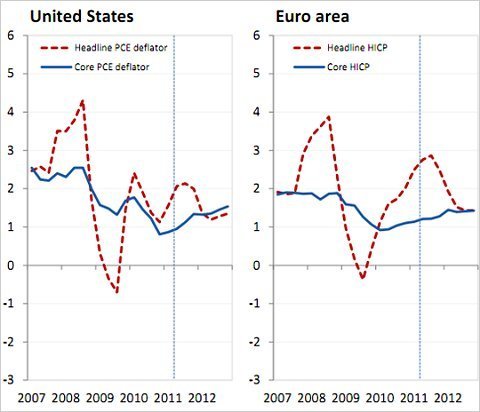Matthew Yglesias's Blog, page 2294
May 26, 2011
Sarah Palin's Excellent Adventure
By Alyssa Rosenberg
Reintroducing herself to the American people as a viable political candidate via a documentary by a guy who executive-produced Julie Taymor's Titus before going on to make conservative movies is a bold move for Sarah Palin. If it works, it's a smart way to turn the Palin family's reality show efforts, which at best are tacky and at worst are attack-ad ready fodder, from a major deficit to an asset, recasting Dancing with the Stars and Sarah Palin's Alaska as media training rather than cash grabs. That said, I don't really think it's going to work. A movie isn't the ritual act of deference that early primary voters are accustomed to.
But there's a more interesting litmus test for the movie than whether it bolsters Palin's political prospects. On the heels of Atlas Shrugged's inability to earn back its budget, Undefeated a test case for whether there's a viable Tea Party market that Hollywood can target. Nikki Finke says the movie will end up in between 50 and 100 markets, so it's not just going to be screened for carefully-selected audiences: they're going to try to make some money on this thing. At one point, Palin was a reliable draw—her memoir, Going Rogue, sold at least 2.7 million copies. But Sarah Palin's Alaska didn't get renewed, and her ratings on Fox haven't been particularly impressive, enough so that the network's declined to pursue future editions of specials she was supposed to host.
In other words, the movie is a real gamble for Palin: it may not resurrect her political career, and if it fails, it could end up puncturing her entertainment brand too.


American Work Is Becoming Less Physical Intense, So American Weight Is Rising

By historical standards, contemporary Americans consume relatively few calories on a daily basis. But of course for the vast majority of human history, an overwhelming share of people were engaged in constant intense physical labor. Running a pre-mechanization farm is hard work. Carrying water is hard work. Splitting wood is hard work. Hand-washing clothing without the benefit of running water is hard work. Etc. And as Tara Parker-Pope notes, the move to post-industrial production only accelerates the trend:
A sweeping review of shifts in the labor force since 1960 suggests that a sizable portion of the national weight gain can be explained by declining physical activity during the workday. Jobs requiring moderate physical activity, which accounted for 50 percent of the labor market in 1960, have plummeted to just 20 percent.
The remaining 80 percent of jobs, the researchers report, are sedentary or require only light activity. The shift translates to an average decline of about 120 to 140 calories a day in physical activity, closely matching the nation's steady weight gain over the past five decades, according to the report, published Wednesday in the journal PLoS One.
It's probably a mistake to look at this through a narrow "weight gain" lens. But it's a reminder that sitting all day at a desk is not really a longstanding human practice. I expect we'll see more and more experimentation with standing desks, those weird inflatable balls I know some people sit on, etc., and that kind of work will lead to health gains.


France's Comparative Advantage: Socialism

Katherine Shaver's Washington Post article about French firm Keolis' bid to manage Maryland commuter rail trains being possibly derailed by lack of disclosure about payments received for transporting Jews during the Holocaust is interesting on a number of dimensions. One of them, not Holocaust-related, is that Keolis is a subsidiary of SNCF (Société Nationale des Chemins de fer Français) which is a state-owned firm. So Maryland is considering following the lead of a number of other American jurisdictions and "privatizing" a public function by contracting it out to the government of France.
For the past thirty years a broadly neoliberal tide has swept all over the world, but France has gone much less neoliberal than other developed countries. As a result, it's seems to have developed comparative advantage in state-owned firms and now has a lot of economic specialization in activities that are either inherently non-competitive (managing trains and electrical grids) or incredibly capital intensive (airplanes and nuclear power plants). My guess is that if everyone tried to copy France, it would be a disaster for everyone, but that to the extent that the bulk of the world has moved in the other direction this constitutes a broadly beneficial kind of specialization.


Harvard Is Not A Mechanism Of Social Justice
Thanks to KW who correctly noted that this Harvard Crimson editorial making the case for contributing to the senior gift would strike a nerve with me:
Senior gift, in general, is a good idea. Harvard College is an institution worthy of our support because it largely succeeds as a mechanism for social justice. By the numbers, few schools do as much to empower the middle and working classes. Harvard has embarked on an ambitious financial aid initiative that has brought scholarship to portions of the population that only decades ago were nearly shut out of higher education. Harvard's broad financial aid program, which strives to prevent students from graduating indebted, has combated the recent hyperinflation of college fees that has mired many young students in debt and forced others away from college completely. Harvard not only promotes socioeconomic mobility but it provides young people who will surely become leaders of industry and politics with valuable critical-thinking skills and exposure to peers from different backgrounds.
Sorry, no. Now, look, if you're considering giving $10 to Harvard or lighting a ten dollar bill on fire, then obviously you should give it to Harvard. But if you've got some cash that's burning a hole in your pocket and you want to give it away to charity and you specifically want to give it away to a charity that "succeeds as a mechanism for social justice" and "promotes socioeconomic mobility" this is an insane course of action. Harvard has a lot of money. Almost everyone needs your money more than Harvard does. Give it to Oxfam. Give it to a homeless person. Next time you're on the T, leave the money on a seat. It's an almost trivial task.

Now if you specifically want to give money to an institution of higher education that promotes social mobility, then you should take a little time and do a little research. You're smart. You had good SAT scores. The Washington Monthly does an annual survey where they attempt to quantify this. Look up the list here. They say the best option is South Carolina State University, a school where 71% of the student body is eligible for Pell Grants and where the graduation rate (45%) is much higher than would be predicted from incoming freshman's demographic characteristics.
That said, I shouldn't slag on Harvard too much. In terms of social mobility it's no South Carolina State or Florida A&M University but it does come out higher on the rankings than the rest of the Ivy League. So my advice to fancy school grads across the board is to send $10 unsolicited to a school that ranks higher on the Monthly list, and send a polite note to development team at your school explaining to them what you did and why. It's clear that elite schools want to be perceived as engines of social mobility. The people who run them need to be made aware that alumni want them to actually live up to this idea.


Legalize Self-Employed Dental Hygenists

(cc photo by Oskay)
Despite the dental cartel's effort to silence me with hired goons it remains the case that one of the craziest policy practices common in the United States of America is widespread rules against self-employed dental hygenists. The way this works is that both dental hygenists and dentists are licensed occupations. And they perform distinct functions. Given the nature of the work, it's quite natural that some dental hygenists would be employed by dentists. But it's also natural that some dental hygenists wouldn't be so employed. After all, there's a lot of demand for teeth cleaning as such. But in many states, it's illegal for a hygenist to work unless she works for a dentist.
The results, report Morris M. Kleiner and Kyoung Won Park, are bad for consumers and bad for economic equality:
We find that states that allow hygienists to be self-employed have about 10 percent higher earnings, and that dentists in those states have lower earnings and slower employment growth. Several sensitivity and falsification tests using other regulated and partially regulated occupations show that our licensing measures are generally robust to alternative specifications. Our estimates are consistent with the view that winning the policy and legal battle in the legislature and courts on the independence of work rules matters in the labor market for these occupations.
There's been a lot of interest over the past ten years among progressives in the subject of the political origins of growing income inequality. But I find there's been less interest in trying to explore specifically what those origins might be. It's not all overregulation of dental hygenists (obviously) but it's also not all Bush tax cuts and Commodity Futures Modernization Act either.


Change You Can Believe In
As a heads up, I want readers to know that this blog is going to go dark tomorrow afternoon at some point and there'll be no new content over Memorial Day weekend. The reason is that the entire ThinkProgress family of web products is being substantially overhauled and when you come back Tuesday you'll see a completely redesigned suite of sites. That entails a lot of changes to various aspects of our work that should give everyone better, more sensible access to all the different work different people on the team are doing, but for this blog the main changes are aesthetic. The site will look different, and the URLs for everything will be go — www.ThinkProgress.org/stuff/etc — instead of the current format.
That said, the old URL will redirect to the blog and I think everyone will like the new look. As for the changes to the rest of the content, I'm gonna keep quiet until everyone can see for themselves, but it's an exciting time for the whole team that should produce a lot of positive change.


OECD Forecasts Below-Target Inflation, Calls For Tighter Monetary Policy Anyway
According to the OECD's Economic Outlook, this is what we can expect from inflation:

During the Reagan-era economic expansion inflation averaged 4 percent. During the Clinton and Bush expansions it was more like 2 percent. So what we're seeing here is a forecast of unusually low inflation. What a central bank that doesn't care at all about unemployment should do under those circumstances is push for looser money. And given high unemployment, the case for looser money is even stronger. But the actual OECD recommendation is for higher rates in order to "help to guard against a renewed buildup of financial fragilities and provide a better starting point in event of a need to react to upside inflation surprises."
I have no idea what that means and neither does Paul Krugman who deems it "mumbo-jumbo, a blizzard of words to justify tighter money despite the absence of any rational argument for doing so."
This is an excellent reminder that I'll be moderating a panel on progressives and the Federal Reserve at the upcoming Netroots Nation conference.


There Are No New Conservative Pop Culture Ideas
By Alyssa Rosenberg
After the rapture-related haterade for Kirk Cameron vehicle Left Behind: Tribulation Force, I feel like I owe the fuzzy-haired one at least this. If the American Family Association is going to make movies about law school students who find themselves and True Love through moot court cases about abortion
they should at least acknowledge that they're totally ripping off the best movie in which college debaters find themselves and True Love through debate championship tournaments where they argue for the repeal of Roe v. Wade in front of the Supreme Court, Listen to Me, which is awesomely terrible:
The assertions that opposing abortion is actually feminist! The hair! The Alphaville "Forever Young"! I actually saw this for the first time in a high school class, and was kind of obsessed with the hilarious awfulness of it for a while. If the folks who are making Atlas Shrugged want to remake this as their follow-up, I would almost certainly go see it, while sneaking a lot of rum into my Coke to ease the pain of the fact that we can't get pro-choice movies or television shows.


Column: "Friends Without Benefits"

I'm up at The American Prospect with a new column on Benjamin Netanyahu's speech to congress earlier this week:
Israeli Prime Minister Benjamin Netanyahu said a lot of things in his address to a joint meeting of the U.S. Congress on Tuesday, most of them foolish and some of them offensive. But one of his very first statements was among the most important: "Israel has no better friend than America," he claimed, "and America has no better friend than Israel."
The former is accurate. The latter is absurd.
Protecting Israel is a special project taken on by the United States. The reasons may be good and bad, but it's a burden we undertake. Israel does us no favors and is no use to us. Recognizing that fact hardly solves the decades-long Arab-Israeli conflict, but it ought to be the starting point for what Americans should debate–not Israel's policy toward its Palestinian subjects but America's policy toward Israel.


New Video Reveals Jon Huntsman's Surprisingly Reasonable Record On Key Issues
My colleague Travis Waldron compiled a pretty comprehensive report on former Utah Governor John Huntsman's secret life as a progressive but for those who prefer to get their political information in video form, the basic point has now hit YouTube in the form of a mock ad:
The sad thing about this is that joking aside, everything Huntsman says in the video—we should tax carbon emissions, we should use fiscal stimulus in a deep recession, we should have a universal health care system—is in fact perfectly consistent with conservative politics. There's no country besides the United States where conservative politicians don't believe in universal health care. Ask Stephen Harper, ask David Cameron—everyone's getting health care. And while the American right isn't totally alone in its spider hole of climate change denialism it's pretty damn isolated. I'm old enough to remember back to 2008 when not only Huntsman but also Tim Pawlenty, John McCain, Sarah Palin, new that we needed carbon pricing.


Matthew Yglesias's Blog
- Matthew Yglesias's profile
- 72 followers



